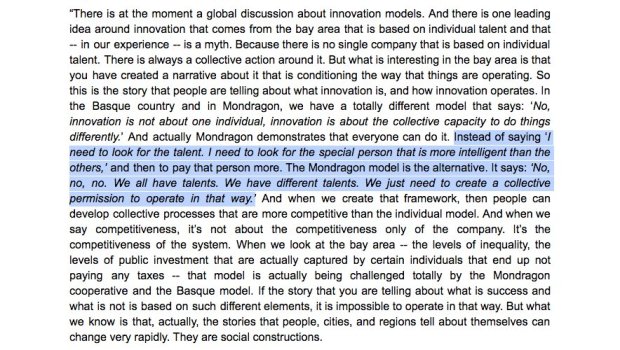
-
Urrian Donostian egingo den ‘Berrikuntza sozialaren bideak’ jardunaldia aurkeztu du Emun kooperatibak, bertan mintzatuko den Gorka Espiau adituarekin batera
Urriaren 25a urruti dago, baina hitzordu interesgarriak aurretik prestatzea komeni denez, berrikuntza soziala zer eta zertan den eta gizartegintzan nola eragin dezakeen jakin nahi dutenek garaiz apuntatu beharko lukete data, egun horretan, 2017ko urriaren 25ean, asteakenarekin, egingo baita Donostiako Tabakaleran ‘Berrikuntza sozialaren bideak’ jardunaldia.
Aurten 20 urte bete dituen Emun kooperatibak antolatutako jardunaldia astearte honetan aurkeztu dute Emuneko zuzendari Olatz Olasok, jardunaldia antolatzen ari den Eider Alustizak eta hizlari izango den Gorka Espiauk. Espiau, hain zuzen, gizartearen arlo oso desberdinetan praktika berri eta eraldatzaileak ezartzeko bideak eskaintzen dituen ikuspegi horretan aditua da. Berrikuntza sozialaren eremuan erreferente eta aintzindari den The Young Foundation-eko zuzendaria da Espiau, eta Agirre Lehendakaria Center-eko kide ere bada. Aurkezpenean azaldu duen bezala, ‘berrikuntza soziala’ adiera eta hurbilketa ugari dituen kontzeptu zabala da, eta zabaltasun horrek berak bilakatzen du ezinbesteko, hain zuzen ere, «oso praktika interesgarriak» ahalbidetzen ari den jardunbidea zedarritzea, eta horren inguruko gogoeta sustatzea.
«Gure gizarteak dituen arazo, erronka eta behar berri edo konplexuei erantzun berritzailea ematea» da, Emunen hitzak erabilita, berrikuntza soziala. Ez nolanahikoa, eta ez «edozein preziotan», justizia soziala eta berdintasuna bezalako baloreetan oinarritua baizik. Emunen kasuan, berritasun soziala ez da teoria, eguneroko jardunean txertatutako zerbait baizik, arlo horretan diharduelako euskararen biziberritzearen inguruko zein beste eremu batzuetako (gizartearen aniztasuna, herritarren parte hartzea, kulturaren kudeaketa…) proiektuetan. Barrura begira ere printzipio horien arabera funtzionatzen saiatzen dira.
Olatz Olasok, hain zuzen, Emunen bilakaeran eta ibilbidean txertatu du gaiarekiko interesa, hizkuntzen kudeaketan eta euskararen inguruko lanean -batez ere eremu sozioekonomikoan- hasi zen kooperatibak duela hamarkada bat ekin baitzion berrikuntza sozialaren inguruko lan zabalagoari, ikusirik euskararen biziberritzearen arloan zein kooperatibenean abiatutako ekimen gehienek asko zeukatela berrikuntza sozialetik, deitura horren pean garatzeb ez baziren ere. Azken batean, gogoratu du Olasok, «behar sozial bati erantzuten zitzaion, modu berriak erabilita».
Egun bakarreko jardunaldiaren xedea izango da, hortaz, berrikuntza sozialari buruz hausnartzea eta Euskal Herrian dauden zenbait praktika ezagutzea, esperientzia zehatzetara hurbilduz horien protagonisten eskutik, formatu berritzaile samarrean. Adituen hitza ekarriko dute hitzaldi nagusia eskainiko duen Yayo Herrero antropologo eta aktibista ekofeministak eta jardunaldia itxiko duen mahai inguruan parte hartuko duten hiru lagunek. Mahaiaren bueltan, ‘Euskal berrikuntza sozialaren etorkizuneko lan ildoak’ gai hartuta, Gorka Espiau bera, Itsaso Olaizola (UEU eta EHU) eta Jose Mari Luzarraga (Mondragon Team Academy) eseriko dira.
Txikitik eragin
«Gizartearen beharreki modu berritzailean erantzuteko, lankidetzan bideraturiko erronkek gizarteari ekarpen aberatsagoa egiten diote eta segur aski, arrakastarako aukerak zabaltzen dituzte», diote. Ez dira ari maila handi-handiko ekimenei buruz, «txikitik eragitea» posible ez ezik desigarrarria ere bada-eta.
Horregatik, berrikuntza-ariketa desberdinetako protagonistei emango zaie hitza 10×10 hitzaldietan: 10 eragile, 10na minututan euren esperientziaren berri eman dezaten. Hor izango dira Fagor, Baigorriko Etxauzia proiektua, Ulma, Emun bera edota Debagoienan, Garesen, Txantrean, Azkoitian, Zarautzen eta Donostian garatzen ari diren esperientziak, jarduera-eremu oso desberdinetakoak.
Izan ere, Euskal Herriak bide dezente du egina berrikuntza sozialaren eremuan, arlo guztietan sortu eta garatu baitira betidanik gizartetik sortutako irtenbide berriak, horren beharrei erantzuteko; behartuta, gehienetan, ardura horiek ez baitzituen bere inork hartzen bere gain.
Une honetan, dena den, egoera paradoxiko samar batera heltzeko zorian egon gaitezte, Gorka Espiauren ustez. «Kontzeptua izugarrizko indarra ari da hartzen nazioartean. Europako Batzordea, esaterako, dimentsio transbertsala ari zaio ematen, eta laguntza-deialdietan ere ari da txertatzen», dio. Denbora kontua zen, beraz, horri erreparatzea eta kanpotik ekartzea etxean geneukana, «hemengoarekin kontrastatu gabe».
Horregatik da garrantzitsua berandu baino lehen «bertako gizarte berrikuntza tradizioan oinarritutako eta bertan sortutako modeloak garatzea», hemengo «aukera izugarriak eta ekosistema berezia» baliatzeko. Hainbat arlotan etorkizunak zein kolore duen ikusita, aurrera begira erabakigarria izan daiteke arlo askotara eraman daitekeen jarduteko modu hori garatzea.
Egiten dena partekatzea eta gogoetari bide ematea da lehen urratsa. Gero ikusi beharko da «nola generatu dinamika berriak kolaborazio-sistemak sortzeko, nola prototipatu, nola eraman eskala desbedinetara» eta «nola txertatu modelo horiek lurraldearen garapenean». Jakinik joera nagusia dela erakunde publikoak, erakunde sozialak eta denetariko enpresak barne hartzen dituzten «modelo hibridoak» sustatzea. Eta komeni dela berrikuntza sozialaren aldeko apustu sendoa egitea modak kontzeptuaren esanahia eta gaitasun eraldatzailea irentsi eta antzutu baino lehen.


